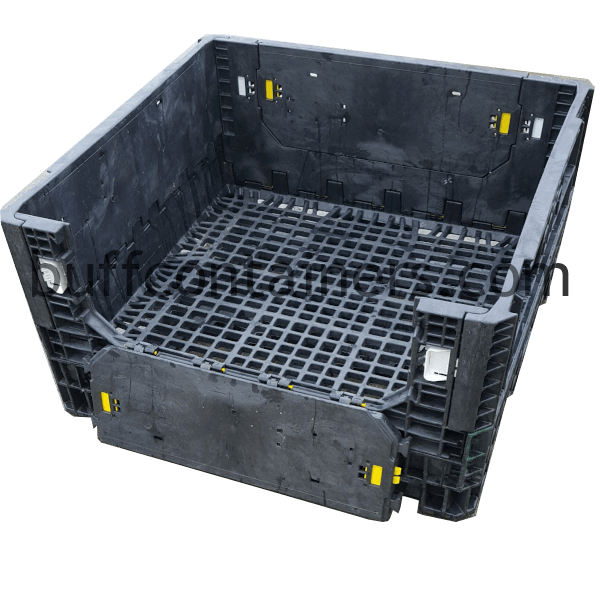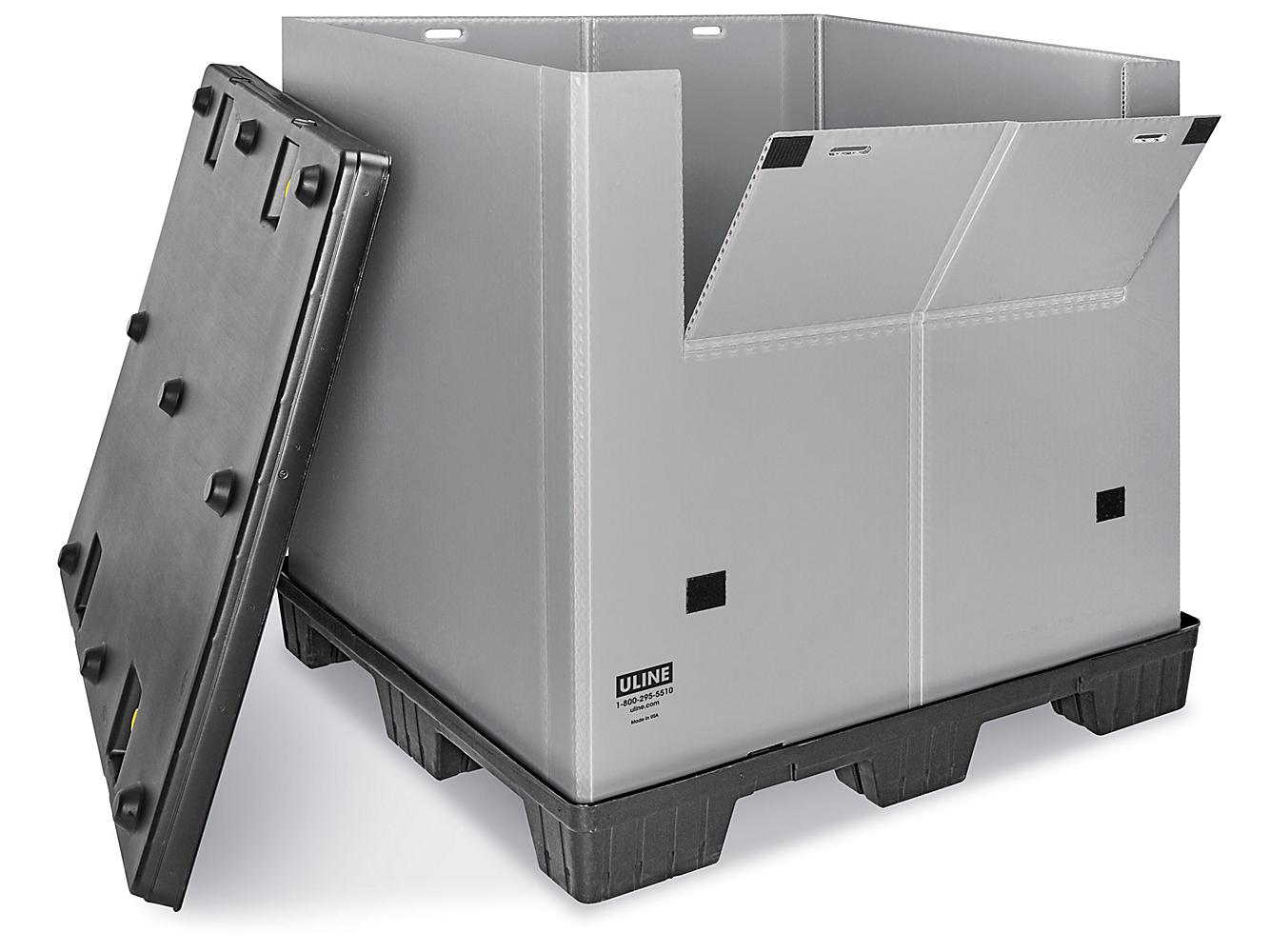The complete buyer’s guide to bulk plastic containers for sale
Wiki Article
A Comprehensive Guide to the Different Sorts Of Mass Plastic Containers Available Today
Bulk plastic containers play an essential role in various industries, offering services for storage space and transport. Their varied kinds satisfy various requirements, from stiff choices for solid products to flexible containers accommodating different forms. Each type provides distinctive benefits, making it necessary to recognize their features and applications. As industries progress, so do the demands for effective container services. What elements should one think about when choosing the right mass container?Summary of Bulk Plastic Containers

Kinds Of Mass Plastic Containers
Mass plastic containers can be found in numerous forms, each suited to specific applications. Rigid bulk containers, flexible mass containers, and intermediate mass containers stand for the key groups, each offering one-of-a-kind benefits. Recognizing these kinds is crucial for picking the appropriate container for moving and saving products.
Rigid Mass Containers
Inflexible bulk containers are important for effective storage and transport of numerous products across industries. These containers are generally constructed from sturdy plastics, permitting them to stand up to severe handling and environmental problems. They can be found in different sizes and shapes, consisting of drums, containers, and totes, making them suitable for saving every little thing from granular materials to liquids. Rigid containers usually feature reinforced wall surfaces and protected lids, making sure the components continue to be secured during transportation. Their stackable style takes full advantage of storage area, making them ideal for stockrooms and producing centers. Furthermore, many stiff bulk containers are recyclable and reusable, adding to sustainability initiatives. In general, their effectiveness and adaptability make inflexible bulk containers a vital element in supply chain procedures.Versatile Bulk Containers
Adaptable bulk containers, usually referred to as versatile intermediate mass containers (FIBCs), function as a flexible solution for carrying and saving a variety of completely dry products. These containers are usually made from woven polypropylene and are made to be lightweight yet strong, permitting reliable handling and stacking. Their versatility allows them to suit numerous shapes and sizes, making them appropriate for items varying from grains to chemicals. FIBCs can be equipped with features such as spouts for simple dental filling and discharge, along with safety coverings for improved toughness. In addition, they are reusable and recyclable, adding to sustainable methods in markets such as farming, food handling, and construction. Generally, adaptable mass containers supply a cost-effective and efficient option for bulk material management.Intermediate Mass Containers
Intermediate bulk containers (IBCs) are essential for the efficient transport and storage space of fluids and granular products throughout different markets. These containers usually have a capability ranging from 275 to 330 gallons and are developed for easy stacking and handling. Made from sturdy products like high-density polyethylene or steel, IBCs offer outstanding protection against contamination and ecological aspects. Their style includes features such as an integrated pallet for forklift gain access to and a removable top for easy dental filling and cleansing. IBCs are widely used in chemical, food, and pharmaceutical fields, making sure compliance with safety laws. Their convenience and reusability make them a cost-efficient option for bulk storage space and transport, adding to provide chain efficiency and sustainability.Attributes and Benefits of Bulk Plastic Containers
Mass plastic containers are important devices in different industries, supplying a combination of durability and usefulness. These containers are built from high-quality products, making them resistant to effects, chemicals, and environmental aspects. This robustness warranties product safety and security during storage space and transportation.In addition, bulk plastic containers are light-weight, facilitating convenience of decreasing and taking care of shipping expenses. Their stackable layout optimizes storage effectiveness, enabling optimized storehouse space. Lots of versions feature secure covers or closures, offering a closed seal that maintains contents and stops contamination.
Mass plastic containers are recyclable and typically recyclable, adding to lasting techniques. Their convenience enables a wide range of applications, from food storage to industrial use, improving their value across industries. Services take advantage of the lengthy life expectancy and reduced maintenance demands of these containers, making them a cost-efficient remedy for both lasting and temporary requirements.
Industries That Use Mass Plastic Containers
Different markets gain from the usage of mass plastic containers, each leveraging their special properties for details applications. The food and beverage market relies upon these containers for secure storage and transportation of items, while the chemical manufacturing market utilizes them for taking care Bulk Plastic Containers of unsafe materials. In addition, the pharmaceutical distribution needs stress the relevance of toughness and tidiness in packaging remedies.Food and Drink Sector
As the need for effective and safe storage space services remains to increase, the food and beverage sector progressively depends on mass plastic containers for their operational needs. These containers provide durable, lightweight, and functional choices for saving components, finished items, and waste products. Made from food-grade products, they guarantee conformity with health and wellness standards. Numerous designs, such as stackable containers and tote boxes, maximize area during transportation and storage space, improving logistical performance. Furthermore, the openness of some bulk containers enables for very easy supply management, lowering the risk of wasting. With the industry's focus on sustainability, several producers are currently offering reusable and recyclable options, aligning with green practices while satisfying the high needs of food safety and security and health.
Chemical Manufacturing Market
The chemical production sector depends greatly on mass plastic containers for the effective and secure storage of raw materials, intermediates, and completed items. These containers are made to endure different chemicals, making certain that hazardous materials do not leak or break down the container itself. Typical kinds include high-density polyethylene (HDPE) and polypropylene containers, which use superb chemical resistance and resilience. Their lightweight nature and stackable layout help with transportation and storage, enhancing area in producing centers. In addition, several mass plastic containers feature features such as tamper-evident seals and easy-to-read labeling, improving security and compliance with industry regulations. In general, bulk plastic containers are essential to the chemical manufacturing process, offering trustworthy options for managing varied compounds.Pharmaceutical Distribution Needs
Drug circulation counts on mass plastic containers to satisfy rigid security and regulatory requirements. These containers are essential for transporting and saving a range of pharmaceutical products, consisting of energetic pharmaceutical components (APIs) and finished drugs. Their style assurances protection versus contamination, moisture, and light, maintaining the honesty of delicate materials. In addition, bulk plastic containers are compliant with sector requirements such as Good Production Practices (GMP) and are typically made from materials that are FDA-approved. The usage of these containers enhances performance in the supply chain, enabling secure, large distribution while decreasing waste. Business in the pharmaceutical sector focus on using long lasting, leak-proof, and tamper-evident containers to ensure product safety and top quality throughout the logistics process.Factors to consider for Choosing the Right Container
When choosing the appropriate mass plastic container, various elements have to be very carefully weighed to ensure perfect capability and safety. The nature of the materials to be saved is critical; compatibility with the container's product can affect integrity and security. plastic bulk containers. In addition, the container's shapes and size need to straighten with the storage and transportation demands, ensuring efficient area applicationLoad capacity is another crucial factor to consider, as it needs to accommodate the weight of components without danger of damages or failure. The style features, such as airing vent or covers, can affect usability and access. Compliance with market policies is crucial, particularly in industries like pharmaceuticals, where security requirements are rigid.
The expected life expectancy and sturdiness of the container must be assessed to confirm it meets the operational demands without constant substitute. By examining these aspects, one can choose the most suitable bulk plastic container for specific applications.
Environmental Influence and Sustainability
As organizations significantly prioritize sustainability, the environmental impact of mass plastic containers has actually come under examination. These containers, typically made from materials such as polyethylene or polypropylene, contribute greatly to plastic waste otherwise handled correctly. Their production entails the usage of nonrenewable fuel sources, which can lead to increased greenhouse gas emissions. Nonetheless, improvements in recycling technology and the growth of naturally degradable options are aiding to alleviate these issues.Additionally, lots of manufacturers are taking on practices that stress using recycled products, thereby lowering the demand for virgin plastics. The sturdiness of mass plastic containers also plays a duty; they are created to be recycled multiple times, which can minimize their total environmental impact when contrasted to single-use options. Eventually, the sector faces the obstacle of stabilizing functionality with environmental duty, making sustainable methods necessary for the future of bulk plastic containers.
Best Practices for Storage Space and Transport
Effective storage and transportation of mass plastic containers substantially influence both operational effectiveness and sustainability. To make the most of area, companies need to stack containers safely, assuring security and preventing damage. Proper labeling is vital for simple recognition, which simplifies access procedures. Additionally, preserving a clean and orderly storage space location minimizes the danger of contamination and improves safety and security.For transport, picking the appropriate vehicle is vital; containers should be protected to avoid shifting throughout transportation. Firms need to additionally take into consideration making use of pallets to promote less complicated loading and dumping. Routine assessments of containers for deterioration can stop pricey substitutes.
Temperature level control is an additional crucial element, as extreme problems can compromise the integrity of the plastic. Finally, training employees on ideal methods for managing and transportation guarantees conformity and promotes a culture of safety and security. By implementing these ideal techniques, organizations can enhance their operational performance while contributing to ecological sustainability.
Often Asked Questions
Just how Do I Tidy Mass Plastic Containers Efficiently?
To tidy bulk plastic containers properly, one ought to wash them with warm water, make use of a mild cleaning agent and scrub with a soft brush. Rinse thoroughly, after that allow to air completely dry completely prior to storage space or reuse.What Is the Life Expectancy of Mass Plastic Containers?
The lifespan of mass plastic containers generally varies from 5 to 10 years, relying on the material, use, and ecological conditions. Appropriate upkeep and storage can substantially extend their functionality and durability in time.Can Bulk Plastic Containers Be Personalized?

Do Bulk Plastic Containers Have Guarantee Options?

Exist Laws for Making Use Of Bulk Plastic Containers?
Yes, regulations exist for using mass plastic containers, largely concentrated on security, environmental impact, and product conformity. These guidelines ensure that containers meet industry criteria and appropriate for transferring various materials securely and effectively.Rigid mass containers, flexible mass containers, and intermediate bulk containers represent the key classifications, each offering distinct advantages. Adaptable mass containers, typically referred to as flexible intermediate mass containers (FIBCs), serve as a versatile remedy for delivering and keeping a selection of completely dry materials. The chemical production field depends heavily on bulk plastic containers for the effective and risk-free storage space of raw materials, intermediates, and ended up products. plastic bulk containers. These containers are developed to hold up against different chemicals, ensuring that harmful materials do not leakage or degrade the container itself. Furthermore, mass plastic containers are compliant with sector standards such as Great Production Practices (GMP) and are typically made from materials that are FDA-approved
Report this wiki page